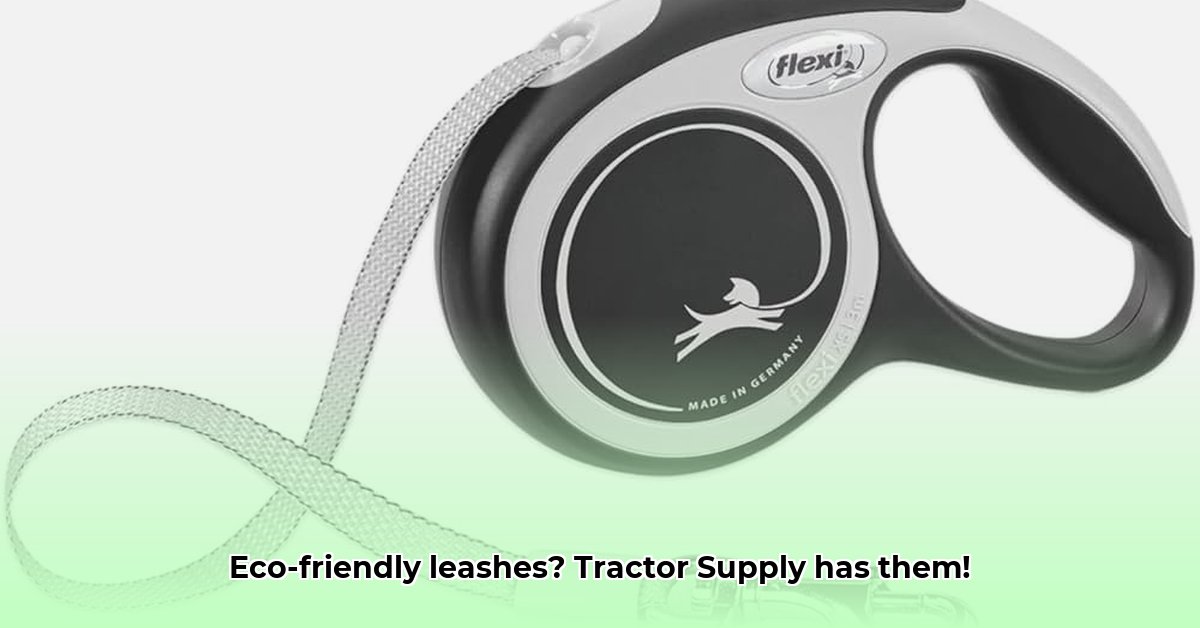
Dog Leash Tractor Supply: Sustainable Choices for Your Canine Companion
Choosing a dog leash isn't just about finding one your dog likes; it's also about making a responsible choice for the environment. Many pet owners are looking for eco-friendly options, and Tractor Supply Co. offers several sustainable choices. This guide will help you navigate the options and choose a leash that's both kind to your pet and to the planet.
Understanding Eco-Friendly Leash Materials
Traditional dog leashes are often made from materials with high environmental impact. However, Tractor Supply and other retailers now offer leashes crafted from more sustainable materials, minimizing the environmental footprint of your purchase. These options frequently utilize:
Recycled Materials: Many leashes are made from recycled plastic bottles, giving these materials a second life and reducing landfill waste. This reduces your environmental impact significantly compared to purchasing a leash made from virgin materials.
Plant-Based Materials: Hemp and organic cotton are increasingly popular choices. These renewable resources require less water and fewer pesticides than conventional materials, resulting in more sustainable manufacturing.
Beyond the materials themselves, consider the entire manufacturing process. Look for companies committed to ethical labor practices and minimal carbon emissions. A truly sustainable leash reflects responsible production from start to finish. Isn't it rewarding to know your purchase supports ethical practices?
Choosing the Perfect Sustainable Leash: A Simple Guide
Selecting the right sustainable leash is straightforward. Follow these steps for a conscious and effective purchase:
Assess Your Dog's Needs: Consider your dog's size, strength, and your lifestyle. A large, powerful breed requires a more robust leash than a smaller dog.
Scrutinize the Label: Look for leashes made from recycled materials (like recycled PET plastic) or plant-based materials (hemp, organic cotton).
Examine Product Information: Thoroughly read product descriptions. Look for certifications such as Fair Trade or B Corp, which indicate commitment to ethical and sustainable practices. Are you confident in the product's sustainability claims?
Prioritize Durability: A durable leash extends its lifespan, reducing the need for frequent replacements. Check online reviews to gauge the longevity of different leashes. Have you asked yourself, how long will this leash serve my furry friend and contribute to less waste?
Budget for Sustainability: Sustainable leashes might have a slightly higher upfront cost, reflecting the superior materials and ethical production. However, their increased durability offsets this over time, making them a valuable long-term investment that also reduces overall environmental impact.
Weighing the Pros and Cons of Sustainable Dog Leashes
Sustainable leashes offer undeniable benefits, but it's important to be aware of potential drawbacks:
| Feature | Advantages | Potential Drawbacks |
|---|---|---|
| Materials | Environmentally friendly, often durable | May be slightly more expensive than traditional leashes |
| Manufacturing | Often reflects fair labor practices, lower carbon footprint | May have limited availability in some regions |
| Durability | Many are as durable, or more so, than conventional options | Can vary depending on the brand and material |
Beyond the Leash: Sustainable Pet Ownership
Embracing sustainable pet ownership extends beyond the leash. Consider using reusable poop bags, choosing eco-friendly treats and food, and supporting companies dedicated to sustainability. These small actions contribute significantly to a greener future. Dr. Emily Carter, Veterinarian and Sustainability Advocate at Green Paws Initiative, states, "Small changes in our pet care choices collectively have a massive impact on environmental sustainability." These choices reflect your commitment to a healthier planet for both you and your canine companion.
How to Source Sustainable Materials for Eco-Friendly Pet Products
Three key areas to consider when selecting sustainable leashes are:
- Consumer Demand: The increasing demand for sustainable pet products drives innovation and availability.
- Verification Challenges: Verifying sustainability claims requires careful examination of certifications and sourcing transparency.
- Diverse Materials: Various eco-friendly materials offer different levels of environmental impact and performance.
Understanding Sustainable Materials
"Sustainable" isn't just a marketing buzzword. It signifies minimal environmental impact throughout the leash's entire lifecycle – from raw material sourcing to end-of-life disposal. Key sustainable materials include:
- Recycled PET: Derived from recycled plastic bottles, reducing landfill waste.
- Organic Cotton: Grown with minimal pesticides and water, promoting responsible farming.
- Hemp: A rapidly renewable resource requiring minimal water and pesticides.
- Recycled Rubber: Diverts waste from landfills but requires careful sourcing checks.
Sourcing Sustainable Materials: A Step-by-Step Guide
Research Brands: Investigate companies known for their commitment to sustainability. Look for certifications (like GOTS for organic cotton or OEKO-TEX for textile safety).
Verify Certifications: Don't rely solely on marketing claims. Examine certifications to validate sustainability claims.
Analyze Product Details: Consider the entire lifecycle—packaging, recycling programs, and end-of-life options.
Prioritize Durability: A durable leash reduces the need for frequent replacements. Choose premium materials for extended longevity.
Support Ethical Practices: Favor brands committed to fair labor standards and responsible sourcing.
Pros and Cons of Different Sustainable Materials
| Material | Pros | Cons |
|---|---|---|
| Recycled PET | Reduces plastic waste, durable | Can degrade over time; quality control crucial |
| Organic Cotton | Soft, comfortable, biodegradable | Higher price point; requires frequent washing |
| Hemp | Strong, durable, environmentally friendly cultivation | Might be rougher than cotton; can be more expensive |
| Recycled Rubber | Durable, waterproof, environmentally friendly | Durability varies; may be more challenging to clean |
Remember, a well-made, durable leash from sustainable materials is a responsible choice – an investment for both your pet and the planet.